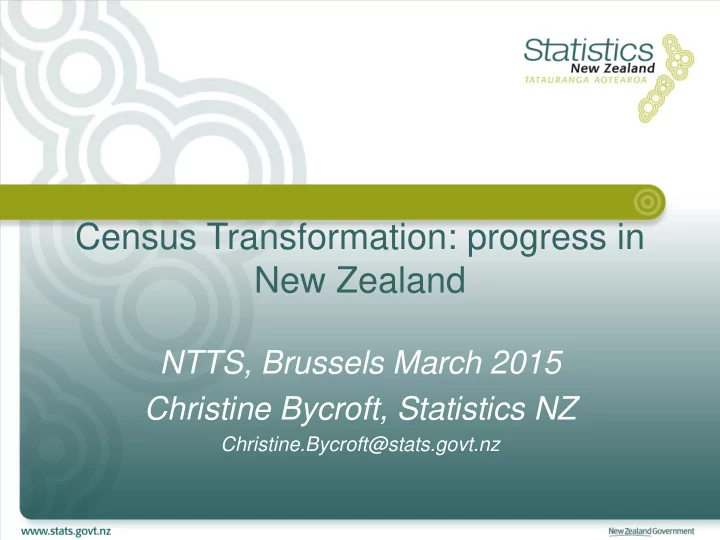

Census Transformation: progress in New Zealand NTTS, Brussels March 2015 Christine Bycroft, Statistics NZ Christine.Bycroft@stats.govt.nz
NEW ZEALAND • Population: four and a half million • Indigenous Māori: 15% • Overseas born: one quarter • NZ-born in Australia: half a million • Moved last 5 years: half • Travel journeys annual: five million
The current census 5 yearly full enumeration 2011 Census cancelled – Christchurch earthquake 2013 Census: • hand delivery of paper forms • 34% online response • “no change” census
Drivers for change ` Increasing cost of census • Including more difficult to get responses Sustainability of the current model? Opportunities from new technologies Availability of administrative data Increasing govt push for integration of data to improve public services
Census Transformation Vision : Administrative census, with survey support Strategy: Short-term: Modernise the current census model and make it more efficient Long-term: Investigate alternative ways of producing small area population, social and economic statistics. • different frequencies for census (5 or 10 yearly) and • exploring the feasibility of a census based on administrative data.
Timeframes Phased and iterative approach, around census cycle 2018 2023- 2012 2014 2015 2026 Census Report to cabinet Mid 2020s Census?? 2018 Census agreed Recommend long-term direction Strategy agreed
Modernising the survey-based census Maintain the quality of census information Reduce the cost of collection – Canadian model • Reduce field staff • Mail-out majority of dwellings • Maximise self-response, targeted non-response follow-up • Digital by default – 70% online target • Increased integration – Statistics NZ and across government • Increase use of administrative data
Challenges for 2018 Moving from ‘no change’ to very large changes • Falling back into ‘old’ thinking Lots of unknowns still, some things not built yet Will most people fill in their census without a personal visit? New communications needed Integration => far more dependencies
Long-term census transformation Census information: what is essential? Legal and cross-government policy issues Public acceptability Technical investigations • IDI: linked admin data – building for research • Linked 2013 Census to IDI • Methodological work: coverage survey and population estimation • Annual large sample survey – size and cost
Will existing admin data be enough?? NZ Has NZ does NOT have Birth, Death, Marriage Central Population Register registers Unique person ID used Electoral registrations across government National IDs for tax, health, National address/ building / education dwelling registers Linked admin sources (IDI) Mandatory address change Migration records Privacy Act
Overlapping data sources
Population coverage of admin sources Minimum Quality Standard At least: • 90% within +/- 1.5% (dark grey) • All within +/-5% (light grey) Using linked administrative data available in IDI, Dec 14 refresh • Included if recent activity in tax or health or education data (1 year) • Removed if left NZ, using link to migration travel records
Challenges using admin sources Population coverage without a population register => over-coverage and under-coverage Probabilistic linking using name, dob, sex Location information – out of date, missing Ethnicity – not standardised across govt Maori Descent and iwi – possible? Limited attributes from administrative sources
How to resolve?? Statistical methodologies: coverage survey and population estimation methods Large scale survey? (‘combined census’) Increase use of admin data in survey model Work across government – design in quality Census, administrative data, and government services are integrated and inter-dependent systems
Recommend
More recommend